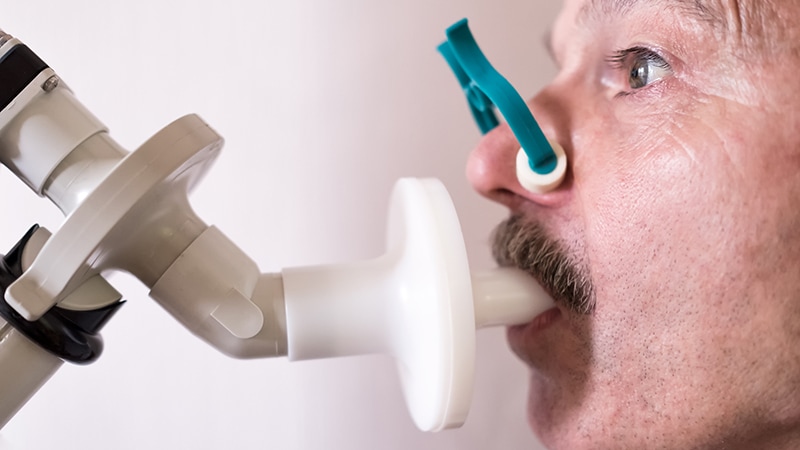TOPLINE:
Vasoactive vasodilating drugs (VVDs) have differential effects on the progression of systemic sclerosis-associated interstitial lung disease (SSc-ILD), according to a post hoc analysis of prospectively collected data. Prostanoids were associated with protective benefits in patients with mild vasculopathy, while endothelin-receptor antagonists (ERAs) were linked to a lower risk of worsening symptoms in patients with more severe disease.
METHODOLOGY:
- Researchers conducted a post-hoc analysis of prospectively collected data from the European Scleroderma Trials and Research group (EUSTAR) database.
- The analysis included 2156 patients with SSc-ILD, confirmed by high-resolution CT, with 5996 yearly visits.
- VVD treatment included ERAs, phosphodiesterase-5 inhibitors, and prostanoids that had been administered for at least 3 months during the study period.
- Progression outcomes were assessed within intervals of 9-15 months using three definitions: progression A (forced vital capacity [FVC] decline ≥ 10% or FVC decline of 5%-9% with a ≥ 15% decrease in diffusing capacity of the lungs for carbon monoxide [DLCO]), progression B (FVC decline ≥ 5% or DLCO decline ≥ 10%), and progression C (New York Heart Association functional class worsening).
TAKEAWAY:
- A total of 80% of the patients were women, with 51% having diffuse skin involvement and 56.5% being Scl-70 positive.
- Prostanoids showed a protective association in patients without digital ulcers against progression A (odds ratio [OR], 0.61; 95% CI, 0.46-0.83) and progression B (OR, 0.76; 95% CI, 0.60-0.94)
- ERAs were linked to a protective effect against New York Heart Association class worsening (OR, 0.42; 95% CI, 0.21-0.86), regardless of digital ulcer presence.
- Over the median 5.6-year follow-up, VVD exposure had no effect on mortality.
IN PRACTICE:
“The beneficial effects of VVDs appear to depend on the severity of the vasculopathy, but further studies are needed to confirm the long-term benefits of VVDs in SSc-ILD,” said study author Adela-Cristina Sarbu, MD, of University Hospital Zurich and Bern University Hospital in Switzerland.
SOURCE:
Sarbu presented abstract OP0003 at the European Alliance of Associations for Rheumatology (EULAR) 2025 Annual Meeting.
LIMITATIONS:
This is an observational study with long follow-up periods during which there were changes in clinical practice and treatment guidelines. There was high heterogeneity in the study population and missing data, including insufficient data to access radiological progression by high-resolution CT.
DISCLOSURES:
Sarbu had no financial disclosures or conflicts of interest to report. Some other study authors had financial relationships with many pharmaceutical companies, some of which market VVDs.
This article was created using several editorial tools, including AI, as part of the process. Human editors reviewed this content before publication.
Source link : https://www.medscape.com/viewarticle/vasoactive-vasodilators-show-severity-dependent-effects-2025a1000fyv?src=rss
Author :
Publish date : 2025-06-14 14:37:00
Copyright for syndicated content belongs to the linked Source.
